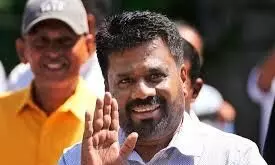
The red sign appearing in Sri Lanka
text_fieldsAnura Kumara Dissanayake, leader of the Marxist-Leninist party Janata Vimukthi Peramuna, was sworn in as the tenth president of the neighboring country Sri Lanka on Monday. He won 42.31 percent of the votes and became the first communist president of Sri Lanka by defeating the opposition leader Sajith Premadasa and former president Ranil Wickremesinghe. The JVP is a party that shifted gears from armed terror and bloodshed with an equal mix of Marxism with Sinhala-Buddhist ultra-nationalism. Its leader made "transformation" a key slogan in his election campaign and repeated the same after taking the oath. He assures that he will do whatever it takes to win the trust and respect of the people in the political system. He promised that all Sri Lankans, including the Sinhala, Tamil, and Muslim groups, would move forward together. Dissanayake, who describes himself as the 'son of working-class parents', believes that the path to popular political transformation is to empower workers and rural people who have been left with no voice in political decisions. His gospel of transformation includes changing the system, ending dynastic rule, introducing a new regime of economic reforms, and fulfilling the aspirations of people at the grassroots level who have been leading the struggle for the past two years against the Rajapaksa dynasty.
Also read: Anura Dissanayake becomes Sri Lanka's first leftist President
Countries of the world far and near are looking forward to seeing what kind of political transformation Sri Lanka will undergo under the leadership of the JVP-led front, which has abandoned the communist extremism that tried to change the system through gun barrels and covert wars, and moved to the moderate democratic line of ballot revolution. The old communist parties in Sri Lanka are the Lanka Sama Samaja Party (LSSP) formed in 1935 and the Communist Party of Sri Lanka (CPSL) which came into being after splitting from the former in 1943. Later, the CPSL split into Soviet and Chinese groups and the CPSL (Peking) soon weakened. JVP was formed by the revisionist Rohana Wijeweera who accused LSSP and CPSL (Moscow) parties of turning popular anger into a leftist revolution by forming post-independence bourgeois governments and squandering the opportunity for a united left front to come to power. When the first rally of the organization was announced in 1970, the organized communist parties looked to defeat the JVP by branding it as a CIA trap and its leader Wijeweera as a CIA agent. In 1971, the JVP resorted to armed rebellion as the regime resorted to repression, including bans, arrests, and beatings. JVP's own history says that ten thousand members or supporters were killed that day.
Also read: Paradise – A parable of our political sensibilities
After the regime changed and freedom was regained, the party decided to enter electoral politics in the 1980s. In the late 1980s, when the anti-Tamil insurgency turned into a civil war, the JVP, fueling Sinhala nationalism, turned to armed insurgency again. Dissanayake joined the JVP in 1987 during this second riot. In the 1990s, the JVP again succumbed to electoral politics and became a part of the coalition administration in the next decade. A Member of Parliament in 2001, Dissanayake became the Agriculture and Irrigation Minister in the 2004 coalition government. Dissanayake and other JVP ministers resigned in protest against the government's capitalist line and the SLFP government's decision to work with the LTTE in the 2005 tsunami relief effort.
Also read: Sri Lanka to lift ban on foreign research ships despite India's concerns
There are doubts in political circles about the moves of the JVP, which has alternated between armed insurgency and parliamentary democratic participation. New Delhi also fears that Dissanayake's tenure of power, which is biased towards Communist China, will put Sri Lanka on the anti-India front which is the only remaining neighboring country with friendly relations. The JVP has opposed the India-Sri Lanka peace accord and is against the 13th Amendment to the Constitution, which gives political power to Tamils, who constitute more than 11 percent of the population. Dissanayake has also strongly opposed Adani's power project on the grounds that it would undermine Sri Lanka's energy sovereignty. India, realizing the growing popularity of Dissanayake, did invite him to India last February. External Affairs Minister S. Jaimankar and National Security Advisor Ajit Doval spoke to him. During the economic crisis in 2022, India had given aid of four billion US dollars to Sri Lanka. However, India has a lot to watch out for when a communist president comes to power in Sri Lanka, which facilitates China's big projects. India is also with hopes about the new move by Dissanayake, who after taking over as president, will show his broad-mindedness to include everyone inside and outside the country.
Also read: Sri Lanka says Katchatheevu issue settled 50 years ago





